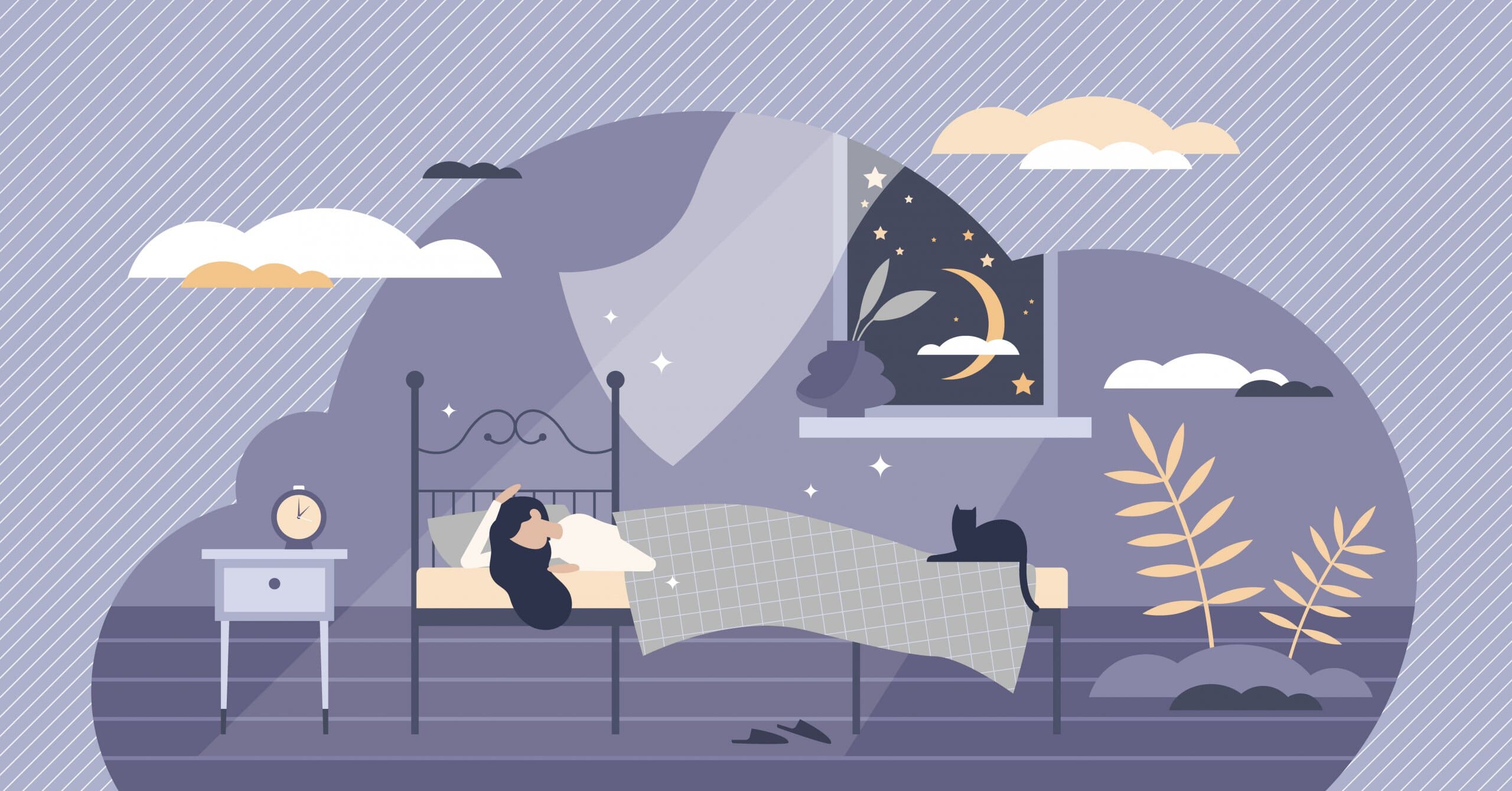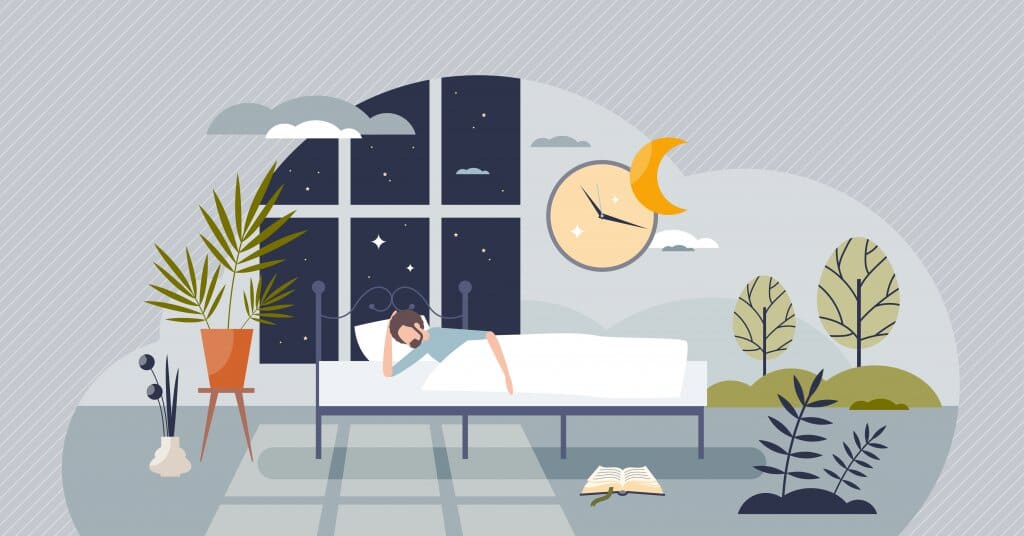Do you often find yourself struggling to drift off to sleep at night? Tossing and turning until the wee hours of the morning in a bid to get that sought-after shut-eye? If so, then don’t worry, you’re not alone. For most of us, there’s always going to be the odd night where we lie wide awake in bed despite our heads hitting the pillow on time. But if you find it difficult to get to sleep on a regular basis, then you might want to think about changing up your sleep routine.
Here at MattressNextDay, we’re all about helping you get a great night’s sleep, which is why our sleep experts have shared their insights into how to build the best sleep routine possible to cut down on those unwanted bouts of insomnia and leave you waking up refreshed and rejuvenated the next morning.
Take a look at our favourite nighttime routine habits below and learn how you can incorporate them into your own bedtime routine going forward!

Sleep routines: The 10-3-2-1-0 method
Starting off with a routine designed to instil proper sleep hygiene, we spoke with Dr Jess Andrade about the benefits of the 10-3-2-1-0 method, and how you can use it as a step-by-step sleep routine guide to prepare yourself for a flawless night of rest:
10 – Stop drinking caffeine 10 hours before bed
When it comes to caffeine, we all know that a cuppa or two in the afternoon is a surefire way to disrupt our sleep later on. Dr. Andrade points out that it can take up to ten hours for caffeine to clear from your bloodstream. So, by giving your body time to eliminate the stimulatory effects of caffeine completely, you’re much less likely to struggle to relax.
Now, this might seem like a long time to go without your coffee fix, but Dr Andrade insists it’s worth it if you want a better night’s sleep – and you can always pour yourself a steaming cup of decaf if you want a hit of that coffee taste after lunch.
3 – No eating or drinking 3 hours before bed
Next, Dr Andrade states you should avoid eating any large meals or consuming alcohol a minimum of three hours before you head to bed to avoid staying awake far longer than you want to. Instead, you should let your body digest and break down any food or alcohol in good time.
Not only will this reduce the likelihood of acid reflux, but it also helps to regulate your sleep-wake cycle (your circadian rhythm); not to mention minimising the disruptive effects of alcohol on your sleep.
2 – Stop working 2 hours prior to sleep
Relaxing your mind should be an essential step for any nighttime routine, and that means stopping any work and mentally stimulating activities well before you bed down for the night.
Dr. Andrade explains that allowing your brain to relax for at least two hours before you try to get to sleep will make it so much easier to calm your mind. So, save any work you’re trying to get done for the next day and avoid getting wrapped up in any stress-inducing tasks – if you allow your mind to rest, your body will follow.
1 – Turn off screens an hour ahead of bed
You probably know that the blue light emitted from your phone or TV screen can suppress your melatonin production; the hormone needed for sleep. But did you know that blue light also tricks your brain into thinking it’s still daytime?
Thus, it’s no surprise that Dr Andrade recommends putting all electronics to the side for one hour before bed. That way, you can spend the latter part of your sleeping routine winding down without distraction.
0 – The amount of times you’ll need to hit snooze
Last, but not least, Dr Andrade recommends avoiding hitting the snooze button on your phone when you wake. If you’ve had enough sleep, you shouldn’t need to do this, as you should wake up ready to face the day.
Sleeping routines: Cognitive reshuffling
Now, as useful as the 10-3-2-1-0 method can be, if you don’t have that much time to prepare for sleep, you can always try the cognitive reshuffling method once you’re already in bed.
In many ways, cognitive reshuffling mirrors the way children fall asleep and boils down to filling your mind with distracting thoughts to tire the brain out. Canadian cognitive scientist, Luc Beaudoin, explains it like this:
- Put on your favourite pyjamas and get settled down into bed.
- Think of a completely random, emotionally neutral word that has at least five letters. Something like ‘chair’, ‘forest’, or ‘pencil’.
- Go through the word letter by letter, spelling it out in your head. With each letter, think of as many words starting with that letter as you can. For example, if you’ve chosen the word ‘forest’ you might start with ‘fairy’ or ‘fountain’.
- Imagine that word you’ve thought of. Build a clear image of your ‘fairy’ or ‘fountain’, then release that image and move on.
- Repeat this as many times as you can for each letter. If you can’t think of anything, just skip that letter and move on to the next.
Beaudoin states that, with this method, you’ll be sleeping soundly sooner than you think, distracting yourself from anxious thoughts and reducing the chances of nightmares occurring.
It’s vital, however, that you choose words that don’t have too much significance to you. Words like ‘money’ or ‘office’ might conjure feelings of worry and stress, so stick to words that hold no real meaning to you.
If you can squeeze it in, we’d actually recommend adding this trick to your bedtime routine alongside our other tips. It doesn't require any effort or energy and is the perfect habit to start getting into once you're already in bed.

What else should you include in your bedtime routine?
When it comes to getting to bed on time, MattressNextDay’s team of Sleep Experts have tried everything under the sun to get a better night’s sleep. As a result, they’ve come together to formulate the best bedtime routine to offer you the perfect night of rest:
1. Work on your sleep hygiene
Preparing yourself and your bedroom for good sleep before settling down is absolutely essential if you want to get a good night’s rest. An unmade bed, a messy room, or lost pyjamas; none of these will help you relax or entice you into bed at the end of the day.
Simply put, focusing on your sleep hygiene is massively important. So, make sure your bedroom is clean and organised, and as comfortable as you can possibly make it. Whether you’re into incense and crystals, or snuggly pillows and fairy lights, make your bedroom a relaxation haven.
Our experts also wholeheartedly agree with Dr Jess Andrade that you should set your electronics to the side an hour before bedtime to help your body recognise that it’s time to settle down. And to replace caffeinated drinks with relaxing teas that aid in relaxation, or a warm bedtime drink like Horlicks.
Martin Seeley, the CEO of MattressNextDay and our Senior Sleep Expert, notes that:
Putting your phone down ahead of bed will prevent you from ‘doomscrolling’. This is where you go down a rabbit hole looking at negative news articles that can induce worry and stress. These feelings directly link to insomnia, so steer clear of gloomy news stories before bed.
2. Take care of morning tasks ahead of time
Do you often find yourself rushing around in the mornings trying to get everything ready for the day minutes before you need to leave the house? Why not take the time during your bedtime routine to complete morning chores and prepare yourself for the next day?
At the end of the day, you’ll sleep much better knowing everything is prepared ahead of time, and it’ll stop you from overthinking about everything you need to do in the morning. Of course, we also know that lots of us lead very busy lives, so it’s best to just do what you can rather than cram in too much.
If possible, prepare a breakfast, such as overnight oats, that you can grab out of the fridge and take to work with you. And if you don’t have that much time to spare in the evening, simple things like leaving your keys in an easy-to-find place, or preparing your outfit and laying it out ready will save you heaps of time and stress when you wake up.
More importantly, though, you should try to avoid leaving chores for the morning. You might not be able to think of anything worse than doing the washing up or taking the bins out when you’re tired in the evening, but it’ll annoy you even more if you have to rush around doing it all in the morning!
3. Try showering in the evening
As much as a morning shower might wake you up, there are plenty of benefits to showering in the evening. So much so that our Sleep Experts recommend making a nighttime shower an integral part of your bedtime routine as a natural sleep aid.
Firstly, a night shower lets you take advantage of the ‘warm bath effect’. Essentially, a warm shower will increase your body’s temperature, which will then naturally cool once you fall asleep, ensuring you don’t get too cold during the night. A warm shower basically helps to regulate this process.
Alongside this, a hot shower before bed can help signal to your brain that it’s time to sleep. That feeling of being warm and cosy will help you relax and unwind, and the steam will assist in unclogging your pores and removing built-up dirt from the day.
Finally, going to sleep physically clean will reduce the growth of bacteria in your bed, helping you to maintain a healthy sleeping space and extending the time needed between washing and changing your sheets – just remember to let your hair dry before you go to sleep to avoid damaging it and waking up with knots, frizz, and dandruff.
4. Practising gratitude
While it might feel a little odd at first, practising gratitude before bed can be a powerful way to improve the quality of your sleep.
When we focus on the things that we are thankful for, it can help shift our focus away from negative thoughts and worries, which are often what keep us up at night, while also increasing feelings of calmness and contentment, soothing your nervous system and enabling you to get a good night’s rest.
One way to practise gratitude before bed is to keep a gratitude journal. Take a few minutes each night to write down three things that you are grateful for. These could be big things, like a promotion at work, or small things, like a delicious meal or a beautiful sunset.
The idea is that by reflecting on the positive aspects of your life, you can help train your brain to focus on the good rather than the bad. Low mental wellness can seriously impact your quality of sleep, and you may end up getting too much or not at all. However, studies show that practising gratitude before bed can ease depressive symptoms.
5. Read a book before turning in
Not to beat the same drum again, but we once again absolutely recommend you stop using electronic devices at least one hour before you intend to sleep. In fact, it’s best if you don’t use your phone, tablet, or laptop in bed at all – although we know that can be difficult.
However, by not using electronic devices in your bed, your brain will associate being under the covers with sleep, rather than being stimulated. Eventually, you’ll find it much easier to unwind when you hit the hay if your brain doesn’t even consider picking up your phone when you’re in bed.
But if you don’t like the idea of just lying there doing nothing in the run-up before sleep, then consider reading a book before bed instead of watching TikToks or scrolling your Instagram feed. Reading has, after all, been proven to have massive benefits for your quality of sleep.
For one thing, enveloping yourself in a totally different universe of fictional characters can take your mind off your own problems and worries. Anxiety, after all, is a leading cause of insomnia, so let your mind focus on the plot of the book rather than the plot of your own story.
Secondly, getting lost in a story can prime your mind to start dreaming, though we recommend you don’t choose a book that will cause unnecessary brain stimulation, such as a horror or mystery novel; otherwise, you might stay up all night reading.
Reading a story to your children as they settle into bed is also a vital part of their bedtime routine, helping them make sense of the world around them and digest the day they've had by relating their emotions to a fictional story.
6. Take your skincare seriously
We're sure you already know that sleeping in makeup is a big no-no. But besides potentially causing skin breakouts, evidence suggests that sleeping in make-up may actually cause premature ageing.
Studies show that dirt and make-up can cause what’s known as 'environmentally-induced oxidative damage', which according to doctors, may induce the breakdown of your skin's natural barrier and eventually premature ageing and wrinkles – undoing all the benefits sleeping has on your skin.
Therefore, the ideal solution to this is to incorporate a skincare step into your nighttime routine. This can be a hard one to stick to, especially if you tend to be super tired come bedtime, but your reflection will thank you years down the line.
To keep things simple, we suggest finding one or two products you love and keeping them out on your bathroom counter so you're less likely to forget to use them. A simple cleanser and moisturiser will be enough to start with, but try to stay away from make-up wipes, as they mostly just move make-up around your face, without cleansing properly.

Final tips for how to get into a good sleep routine
As exciting as it can be to start a new sleeping routine, it’s important to remember that these things take time. Don’t be disappointed if you can’t get something to work straightaway, it can take upwards of 2-3 months to form a new habit, and certain sleep habits simply don’t work for everyone.
So, if you do find yourself accidentally taking your phone to bed with you, or forgetting to do the washing up before bed, don’t be discouraged or too harsh on yourself. These things take time, and you’ll get there eventually.
And remember, making sure you take the time to look after yourself and get into a good routine is vital for making a bedtime routine work in the first place, part of which might include swapping out your old bed set up with a new mattress and sturdier bed frame – all of which you can find in the MattressNextDay range.
Whether you’re searching for a king-sized model or a comfortable memory foam design, browse our collection today to see what we have on offer. Don’t forget to visit our sleep and guide hubs as well for more pieces like this one, such as our piece on cortisol and sleep.


